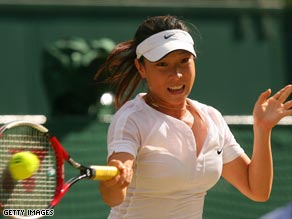CNN
BEIJING, China -- As Wimbledon 2009 gets under way this week, sports commentators and tennis aficionados will closely watch China's tennis superstar, Zheng Jie.

China's Zheng Jie during her semifinal tennis match against Serena Williams at Wimbledon
She is one of the seeded players who could steal the limelight in women's singles. If she does -- she won her first preliminary match on Monday -- it won't be the first time.
Zheng captured the hearts of many at Wimbledon last year when she beat top-seed Ana Ivanovic in the third round.
"Ana is the world number one player, I won over her and that gave me a so much confidence," she told CNN, recalling one of the biggest upsets in Wimbledon history.
"With that confidence I played into the semifinals," the diminutive player added.
Her remarkable run stumped some commentators who could barely pronounce her name, (her surname is pronounced "Jung", her first name "Gee-yeah") so unknown was the wild card ranked 133rd in the world.
It was a fairytale story for the Sichuan native, who became the first wildcard to reach the semis of the women's singles at Wimbledon.
Don't Miss
Her performances inspired her country, with more than 100 million Chinese watching the live TV coverage of her semifinal match against America's Serena Williams.
Though Zheng lost, it was by far the best performance ever by a Chinese player at a major.
"When I returned to China, I was welcomed by a huge crowd at the airport," she gushes. "I was thrilled that I could turn so many people's attention to tennis."
Zheng won even more points off court. She donated her Wimbledon prize money to the Sichuan earthquake relief fund and spent time helping the victims and reconstruction efforts.
"My parents and most of my friends are in Sichuan," she said. "I hope I can do more to help them."
Zheng learned the rudiments of tennis growing up as a child in China's lush and rustic heartland. She was barely seven when she tried out in a local sports clinic to train for tennis, a sport her parents had never even heard of.
She trained doggedly, showing speed and boundless enthusiasm. When the coaches chose two from the scores of trainees, they selected her -- along with Yan Zi, a fellow Sichuanese and long-time women's doubles partner.
Zheng is mostly known for her women's doubles successes partnered with Yan Zi. They have won several WTA doubles titles, including Wimbledon 2006 and the bronze medal at the 2008 Beijing Olympics.
Zheng's career path as a singles player is less straight. She started her pro tennis tour in January 2003 and by the end of that year, she had moved into the world's top 100.
By 2005, she ranked 42nd. But she suffered an ankle injury at the 2007 French Open, forcing her to miss all events that year, including the chance to defend her Wimbledon women's doubles title.
Her world ranking plunged as she underwent rehabilitation. On the eve of Wimbledon 2008, she was ranked 133. "Even though the injury made my world ranking plunge, it also made me grow up a lot," she recalls.
When she returned to competition, she carried on the court a small bottle containing the bone fragments cut from her ankle, just to remind her of how lucky she was to compete again.
More accolades followed her success. Last March, Zheng got the 2008 WTA Tour "Comeback of the Year" award for having "rebounded from an injury-marred 2007."
Thanks to the emergence of world-class stars like Zheng, tennis is growing rapidly in China. An affluent middle class and many top government officials have taken up the sport, boosting its social status and commercial appeal.
Tennis courts have sprouted in major cities while academies are attracting youths who idolize super-stars like Roger Federer, Serena Williams and local standouts like Zheng Jie.

Zheng's success -- she is said to have earned over $1.8 million in prize money as a pro -- has also helped put the spotlight on tennis, attracting wider TV coverage and lucrative commercial endorsements.
"I really like playing tennis and I was ambitious," she told CNN about her youth. "If you say I can't make it, I'll prove to you that I can." With Zheng's mental toughness and will to win, Wimbledon fans may have to get used to hearing her name, properly pronounced "Jung Gee-yeah".

 Sit tight, we're getting to the good stuff
Sit tight, we're getting to the good stuff
